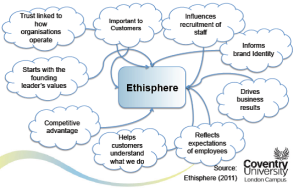In the academic journal of ‘Do Ethical Leaders Get Ahead? Exploring Ethical Leadership and Promotability’, Rubin et al (2010: 217) insist that ‘the evidence suggests that ethical leader behaviour can have important positive effects on both individual and organisational effectiveness’. This blog explores this debate by using examples of organisations and discusses the different sides of the debate.
Benefits of ethical leadership
The first point to examine is benefits of ethical leadership. As shown in Figure 4.1, there are various positive outcomes in relation with ethical practices in business (Smith 2011). In fact, testimonials of top executives of world’s most ethical companies clearly reflect that there is a relation between business ethics and business results (Ethisphere n.d.). Moreover, it has been found that values and ethics of founders of organisations have strongly influenced on their corporate culture.
The philosophy of a company will affect to its ethical practices and how to behave with its stakeholders will lead to building trust. Since intangible asset like trust from customers and suppliers can lead to competitive advantage of a company, ethical business practices could contribute to a company’s sustainability of the business.
Figure 4.1: Why is Ethical Leadership Relevant (Watkins 2013: 8).
The different sides of ethical leadership
The next point to argue is the consistency of ethical behaviour of leaders. By examining the above debate, it is assumed that Rubin et al’s presupposition will be that all leaders are to behave ethically all the time.
As an employee, we tend to expect the certain level of standard behaviour from our leaders and observe their behaviour within an organisation while we are working with them. From this perspective, we would role model their behaviour constantly even without realising (Watkins 2013).
However, whether leaders always behave in an ethical way will be questioned. It may be realistic that leaders behave partially right rather than completely right. One of the main reasons why leaders’ ethical behaviour would be inconsistent is that their behaviour will change depending on an internal and external situation (Elm and Radin 2011).
External influences sometimes may make leaders unethical decisions (Loh and Wong 2009; Marsh 2013). More specifically, shareholders’ view on ethics and Corporate Social Responsibility could be different from that of stakeholders. Shareholders may largely focus on whether a company will increase their wealth than being ethics.
One example of this is that Barclays bank’s tax avoidance case in 2012. Although all Britain’s major banks have adopted the Banking code of Practice on Taxation, the bank abused a tax scheme and tried to pay less tax (BBC 2012). Indeed, to avoid tax by abusing the system is not regarded as ethical and moral practices from both corporate and individual points of views. Yet, this cannot be proved that Barclays has adopted unethical business policies. On the contrary, the bank has ethical standards about making responsible decision in how manage the business (Murphy et al 2012). Therefore, it is presumed that some managers at Barclays may have been pressured to reduce expenses so as to generate more profits. Under a certain situation, there are possibilities that leaders would conduct unethical business performance.
Marriott International Inc.
Marriott International Inc. has been recognised as one of the world’s most ethical (WME) companies by the Ethisphere institute for the last six years (Marriott 2013). As a global hospitality company, it will be important to conduct ethical business practices since good ethics will give validation of the Marriott brand that will attract and retain customers all over the world.
In fact, ‘Acting with Honesty and Integrity’ is the core of Marriott’s ethical standard (2011: 7). Operating the business with integrity has been a pillar of Marriott’s culture since the foundation of the company. The philosophy of J.Willard Marriott, who was the founder, is behind all Marriott policies, procedures and system. The company regards that how to conduct business is equally important to the business they do. ‘Acting with Honesty and Integrity’ will indicate that the company is aiming at being successful as the way they are proud of.
Furthermore, as human resource is one of the important assets for the hospital company like Marriott, J.Willard Marriott’s value, ‘take care of associates and they will take care of the customer’ will contribute to retain followers. Marriott’s ethics will reflect to its employees and those employees will bring their dedication to the company (Marriott n.d.; Ethisphere 2011).
Conclusions
Leaders sometimes will have to make difficult decisions which may cause them ethical dilemma. Although there will be inconsistency in ethical conducts in business, success without having sense of proud and well-being would be vain.
As examples of WME companies shown, it is possible to maintain financial success while practicing the ethics. Thus, to grow ethical leadership is crucial as it will bring multiple benefits including retaining customers, attracting talented workforce and improving employees’ moral.
(782 words)


I like your example as a good reference!
Thank you for your comment nguyennhat. Which points exactly did you like in my example?
takahase thank you for the blog, this question has been interesting for me always. And it is an interesting point you made about connection between profit and ethics.
Thank you for your comment culcoli. Almost all major companies value their ‘corporate responsibility’; therefore, it seems to me that companies now focus on not only making profits, but also how they can contribute to society and stakeholders. In a way, I suppose ethics will lead to profitability of a company.
Yes, i agree. But me personal opinion that ethics is not the same for every company and most companies are becoming ethics when society want them to (basically the best companies anticipate demand).
Thank you for your comment, culcoleoliola.
My understanding about the ethics is more like ‘the morality’ of a company; therefore, I personally think that there will be common norms of ‘the ethics’.